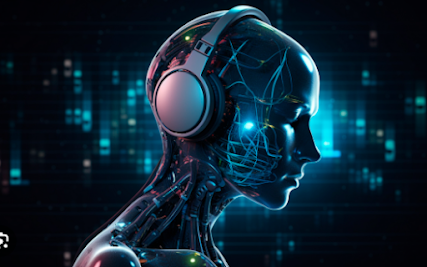 |
| AI impacts on music spans |
The impact of artificial intelligence (AI) on music spans various aspects of creation, composition, production, distribution, and consumption. Here's a breakdown of how AI is influencing the music industry:
Composition and Songwriting
AI algorithms can generate music autonomously based on predefined parameters, styles, or inputs. Platforms like Amper Music and AIVA utilize AI to compose music tailored to specific needs, such as background tracks for videos or video games.
AI tools can analyze vast amounts of musical data to generate insights into composition trends, chord progressions, and melodic structures, aiding composers in their creative process.
production and remixing
AI-powered software, such as IBM's Watson Beat and Google's Magenta Studio, assists producers in generating new musical ideas, remixing tracks, and experimenting with sounds.
Machine learning algorithms can enhance audio production by automating tasks like mixing and mastering, adjusting levels, and applying effects, thereby streamlining the production process and reducing manual labor.
personalized music recommendations
Streaming platforms like Spotify and Apple Music utilize AI algorithms to analyze user preferences, listening habits, and contextual data to deliver personalized playlists and recommendations.
AI-powered recommendation systems enhance user experience by suggesting relevant artists, albums, and tracks, leading to increased engagement and discovery of new music.
copyright protection and content ID
AI technologies enable content identification and copyright protection by scanning audio files and detecting unauthorized use or infringement. Platforms like YouTube's Content ID system leverage AI algorithms to match uploaded content against a database of copyrighted material, helping rights holders manage their intellectual property.
Music analysis and insights
AI tools can analyze music compositions, lyrics, and audio recordings to extract valuable insights into musical structure, sentiment, and genre classification.
Music analysis algorithms enable researchers, musicologists, and industry professionals to study musical trends, cultural influences, and audience preferences, facilitating data-driven decision-making and artistic exploration.
interactive music experiences
AI-powered interactive experiences, such as generative music installations and virtual reality environments, offer immersive and adaptive musical experiences that respond to user input, movement, or environmental cues.
Projects like Google's NSynth and OpenAI's MuseNet explore novel approaches to musical expression and synthesis using AI-generated sounds and compositions.
Overall, AI is
revolutionizing the music industry by augmenting creative processes, enhancing
production workflows, enabling personalized experiences, and providing valuable
insights into musical content and consumption patterns. While AI presents
exciting opportunities for innovation and experimentation, it also raises
important ethical, legal, and artistic considerations regarding authorship,
ownership, and the future of human creativity in music
